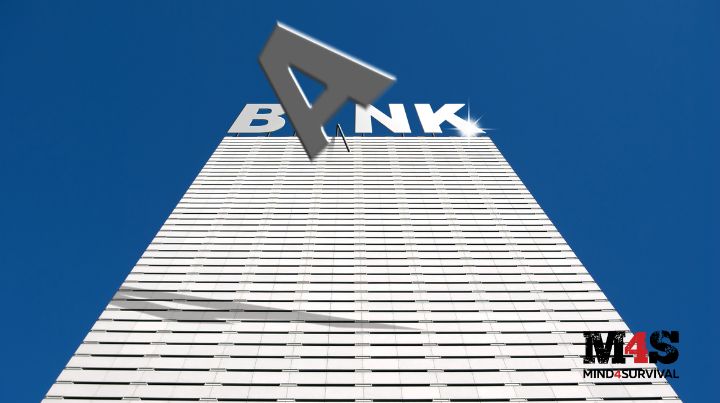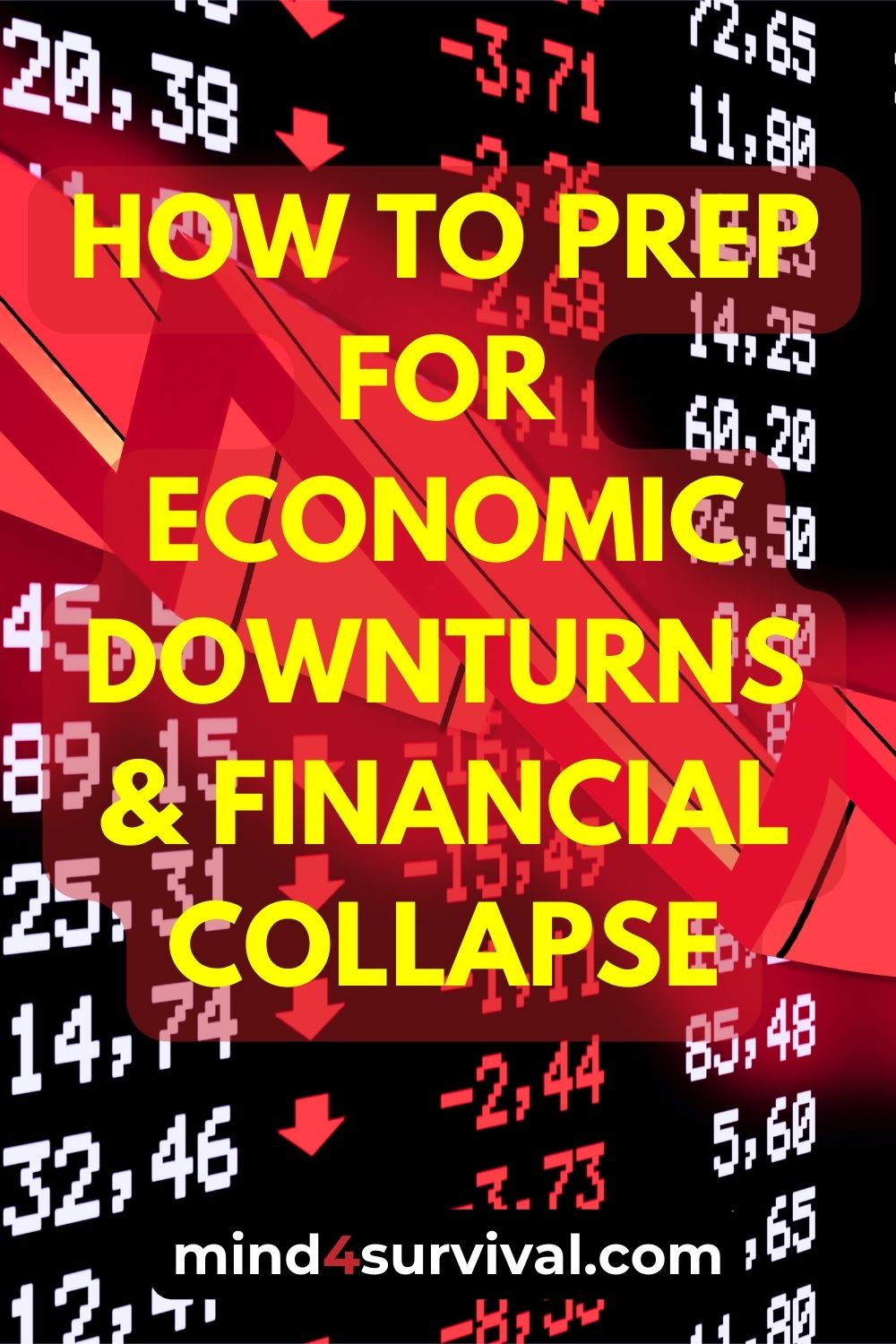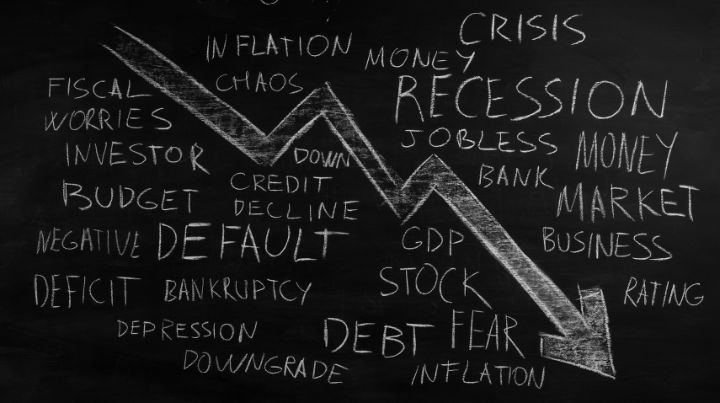How to Prep for Economic Downturns and Financial Collapse

Most, if not every, man-made SHTF starts with the economy going bust or the financial collapse of a government. No nation or civilization makes war, suffers (or attempts) an invasion, coup d’état, or goes into civil war when there’s abundance and prosperity.
It’s when things turn bad that cooperation ends. Diplomacy, politics, and society start to unravel, with people fighting for everything and for nothing amongst themselves and against others. Even bloody conflicts with seemingly nationalistic, religious, or racial character have an underlying system in disarray at its root: sovereign defaults, currencies dying, hyperinflation, excessive debt, and so on.
Likewise, disasters stemming from decaying and failing infrastructure, as well as crime and social violence of all kinds, tend to go up when the economy is dragging. Bridges, dams, and power plants can and do fail at any time. Likewise, predators and criminals will always exist and keep acting regardless of the context.
But besides the fact that people are more inclined to take care of their lives than to fight others when times are good, the whole system that keeps things “civil” and the well-oiled supply chain gets impaired during recessions and may freeze or stop working after a financial shock.
Unlike other kinds of SHTF, economic busts are cyclical. They cannot be avoided but are accelerated and worsened by the intervention, greed, and corruption of governments, authorities, bureaucrats, and the elites. Those are all crucial things to remember because they influence how we prepare.
Economic Downturns and Financial Collapses Are Not the Same
It’s also important to be aware these two events differ in nature, depth, dynamics, and timing. Sure enough, both can happen simultaneously; many examples exist in recent history.
Without getting too technical, recessions are more common, while actual financial or monetary collapses, more disruptive and impactful, are rarer – particularly in stable places (i.e., the First World countries). More to the point, while a crash in the economy or the finances of a country (or region, block, whatever) are actual disasters by themselves, they’re also potent harbingers of even more severe SHTFs.
When it comes to businesses, individuals, and families, if finances are screwed, everything else goes wrong. It’s the same dynamic with sovereign nations: governments mess up the finance and free market, and the economy goes out of whack, which may topple the foundations of finance even further.
Please note I’m not sticking to formal definitions but practical affairs because they matter much. The consequences impact our lives if we discuss preparing and dealing with economic slumps or financial collapses and their dynamics.
The Economy Usually Goes Bust in Slow-Motion
The adage about how people and businesses go bankrupt – first slowly, then suddenly – applies in this case. According to research, the average duration of recessions in modern times is 17 months. It doesn’t sound much, but it’s enough to cause profound devastation in businesses and people’s lives.
In a recession or depression, people become aware of what’s happening and where things are headed. Everyone gets impacted, if not directly by inflation, unemployment, and such, by the social decadence brought by it (Thirdworldization: wealth concentration, widening social gaps, rising crime, social unrest, and so on).
There’s time to adapt, meaning life can suck but at the same time feel more or less normal, depending on the cycle we find ourselves in. As the situation worsens, turmoil, protests, demonstrations, and strikes become more frequent and violent. However, unrest is not as severe, widespread, or lasting, as the system keeps chugging along and can recover between the slumps. People crave normalcy.
That’s the stage we’re currently in. The increase in number and escalation in regional conflicts, the surge and spread of social unrest in Western nations (even ones previously deemed safe and civilized), migration waves, and the issues with the infrastructure and supply chain everywhere all have a solid economic component at their root.
Financial Collapses Happen Suddenly
Something snaps. It can be a severe stock crash, a deep and sudden currency devaluation, or a default. Or, a severe issue with bonds, derivatives, and other debt instruments – the hidden and much more significant part of the iceberg. The shock sends the whole market into panic. Boom – now things can hit the fan.
Ripples spread out like wildfire, contaminating everything and leaving people desperate and paralyzed. The system can crack and freeze, as it usually does. The consequences can be severe, but the responses of institutions, authorities, and governments are frequently worse: bank shutdowns, account suspensions, confiscations, revocations, emergency decrees, loss of freedoms, and more, leading to accelerated Thirdworldization or even direr scenarios.
A declining and dragging economy, with low growth, slowing industrial activity, and consumption, can lead to a financial collapse if the structures that support that hidden part of the iceberg are overstretched or rotten. Sovereign, corporative, and individual debts skyrocketing, a highly manipulated market, centralized policies, and wealth concentration reaching unsustainable levels are signs this could be the case this time.
It’s worth noting that a Black Swan event can also accelerate a decline in the economy or spur a deeper, widespread financial meltdown. COVID-19, Ukraine, and now the Israel-Hamas conflict will have an impact on the global economy, many of which will be clear or felt only in years to come. Cyberattacks and other threats can also destabilize things further globally.
How to Prep for Economic Downturns and Financial Collapses
I’m not qualified to provide financial advice. My goal with this post is to explain the differences and dynamics of economic crises and financial collapses and the influence this can have on our preparations. It’s about knowledge, awareness, and mentality.
However, I can share some general insights and directions based on my personal experience and that of my family during the hard years, going through multiple failed economic plans, boom-and-boost cycles, and so on.
The world has changed quite a bit since the 1970s and 80s; however, human behavior hasn’t. The two main drivers behind most human actions are greed and fear, with the latter being a more potent and imminent motivator. That’s why markets take the stairs going up and the elevator going down.
There’s no way to time these developments, so we must assume positions beforehand and remain alert. There are signs that we’re at the last stages and nearing the tipping point of a more profound and severe crisis, one that governments and bureaucrats won’t be able to paper over or hide.
Boosting Savings, Cutting Expenses, and Increasing Income
There’s no way around it: everyone needs money to pay for expenses. Bills will keep coming every month regardless of the situation, even if your country is being invaded or at war. During a crisis or shock, it’s the same.
We must keep going no matter what; no stockpile can last forever, and we can’t pay for rent, electricity, or the kid’s education with freeze-dried food or ammo. Skills are undoubtedly helpful if they can be marketed or bartered. But everyone still needs income.
It’s also necessary to cover for second-order effects of a dragging economy, such as unemployment and bankruptcy, rising crime and violence, and social unrest in protests, strikes, and others that can impact infrastructure, transportation, law enforcement, and utilities. Blackouts, crime waves, and fuel or food shortages tend to return during these periods.
Know that when the lights go out, even for a short period, crime goes up immediately, particularly in this volatile context we’re currently in. Home security should be a priority, regardless of whether you live in a city, the suburbs, or rural areas.
Cash Is King
Financial collapses are shocks. Most result in a liquidity crisis, and 90% of the people get caught by surprise 99% of the time. Here’s the script: it’s Friday, and a bank shutdown is announced. ATMs get emptied in hours. Credit and debit cards and other electronic means of payment may or may not work, partially or entirely, also thanks to system overload.
The whole machinery that keeps the wheels of money spinning freezes down: if brokers can’t operate (because the stock market is in a circuit break), nothing else moves. The system is designed that way to prevent further damage, and most people have no idea.
From there on, it gets worse. Zeroes get slashed, accounts confiscated, and new taxes announced. We’ve been through all that and lots more. It caused endless pain for everyone. I can only imagine that being much worse nowadays, with recent generations’ dependence on technology and the lack of “crisis memory.” Back then, debit and credit cards and online/electronic payment systems had yet to be invented. So people naturally kept some cash always at hand; it was that or nothing.
Wealth Is Never Destroyed – It Only Changes Hands
Crises can bring big opportunities. However, the great majority get wiped out or, at the very least, have their standard of living impacted. My father lost everything during the 1987 market crash in Brazil, and it took over a decade to recover partially. I don’t wish that for anyone.
In a scenario like that, those who “lose less” also have a greater chance of coming out in better shape. It’s perfectly possible to build and multiply wealth in a crisis by betting against banks, funds, and even currencies, as investor Michel Burry and a few others showed during the 2008 GFC. But that’s for professionals, and the risks are enormous.
So unless you know what you’re doing, opt for more mundane yet effective strategies for the common folk. The basic also works for most people: multiple and varied income sources, cutting expenses, tightening the belt, and caring for your health. Stay prepared, stick to your plan, and keep calm.
Conclusion
I want to wrap this up by pointing to a couple of books that might be useful for those looking for deeper divers into the history of recent and past events from various countries and how to prepare and survive these.
Fernando “Ferfal” Aguirre’s “Surviving The Financial Collapse” is a realistic, precise, and insightful account of Argentina’s economic and financial meltdown after its 2001 default on its sovereign debt. It’s based on an actual disaster and contains a lot of practical, real-life, useful tips.
Lionel Shriver’s “The Mandibles – A Family 2029-2047” is a fiction on the same theme (the consequences of a sovereign debt default), but in the U.S.. Ash River ventures into futurology to describe how a slow economic decline and total collapse in the U.S. would unfold and the implications for the ordinary people.
What are you doing to prepare for an economic downturn? Let’s talk about it in the comments!
Additional Resources:
- Compounding Problems of the Recession
- Thirdworldization of the U.S. and the Stages of a Collapse
- CRISPR Technology: What Preppers Need to Know
- Invest in Yourself

Don't Miss Out!
Join the thousands of people who rely on Mind4Survival preparedness advice by subscribing to our FREE newsletter.
- Practical preparedness information
- Zero Spam
- < 0.25% of people unsubscribe




Join Mind4Survival!
Stay informed by joining the Mind4Survival! 100% Secure! 0% Spam!
Follow Us!
Affiliate Disclosure
Mind4Survival is a free, reader-supported information resource. If you make a purchase through our link, we may, at no cost to you, receive an affiliate commission.




Fabian Very well articulated! We left Southern California 3 years ago to a small town in center of AZ up against a national forest & thus easier to bug out beyond being prepped at home. But the problem is we’re on a direct highway to and from Phoenix & that’s an issue when SHTF happens! Phoenix folk already come up in droves as we noticed last few years, so besides the bad element many normal folks would gravitate up here to escape since they’re familiar with area.
Following Joel Skousen’s advice In 📕 ‘Strategic Relocation’ avoid being in path of major metro areas when things go wrong! Years ago we escaped Covid lockdowns & mandates nonsense in Commiefornia but now the dynamics of societal collapse had us looking elsewhere & moving a few states over in a Christian Conservative area where people are more apt to help each other than rip each other off. ‘Hope for Best But Prep for the Worst’ is my motto! Next year being a [S]election year things will get ugly (er). Just watched ‘Police State’ Documentary by Dinesh D’Sousa & Dan Bognino so we also have to worry that Feds in heavy armor come breaking down your door! Sad of what’s happening to our Constitutional Republic that attracted immigrants like myself to land of liberty & freedom with current puppet government pushing chaos division & foreign wars while having a wide open borders.where Anybody friend and foe can walk right over.
Friends recently were collecting firewood in the forest nearby & ran into a drug cartel as they avoid freeways and use dirt roads or small highways, had the tinted big black SUV & black uniforms. They lived to talk about it! Fentanyl is rampant in AZ so local law enforcement recommend citizens carry Narcan So We’re out of here! But in reality nowhere is safe if we can’t control our borders and don’t have a government by the People for the People. 😞